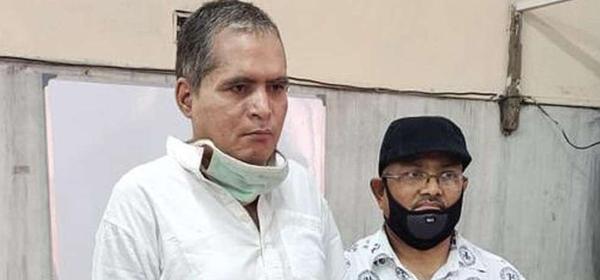
When Radheshyam Das was released from Dum Dum Central Correctional Home in Kolkata last October after serving a 10-year sentence, he had one thing in mind—to help secure the release of Durga Prasad Timsina (aka Dipak Jaisi), a resident of Mai Municipality, Ilam, from prison.
Das shared a cell adjacent to the 60-year-old who had been in prison without a proper trial for the last 40 years.
And on Saturday, Timsina was released following a verdict from a joint-bench of Kolkata High Court Chief Judge Thottathil B Nayar Radhakrishnan and Judge Anirudra Roy on Wednesday.
Das had told the West Bengal Radio Club about Timsina and soon news spread of a Nepali man imprisoned for the past 40 years in an Indian jail without a formal court trial.
Hirak Sinha, a lawyer, was one of those who heard of the case and wanted to meet Timsina.
Sinha contacted the West Bengal correctional home inspector general of police and requested a meeting with Timsina. Sinha’s request was granted and he went to the Dum Dum prison and met Timsina.
“When I initially met him, he was in a poor condition,” recalls Sinha. “He couldn’t even speak. He wrote his parents’ name after I handed him a pen and a paper.”
After meeting Timsina and seeing the situation he was in, Sinha decided to take up his case for the sake of humanity.
A murder charge had been filed against Timsina at the Darjeeling Police Office on May 11, 1980 by one Naine Ghale of Darjeeling. Ghale, in his complaint, had accused Timsina of murdering his wife Junu Gurung. However, the complainant was not contacted later during the case investigations.
“There is no doubt that Ghale filed a false complaint against our brother,” said Prakash Chandra, the younger brother who had gone to receive him on Saturday after working on his release. “It looks like my elder brother was framed under false accusations.”
Speaking to the media briefly after his release on Saturday, Timsina said, “I was innocent.”
Timsina lost his father at a very young age and he began looking after the family in his youth after his mother was seriously injured in an accident. He headed to Mangalbarey in Ilam to do business in 1980. However, business prospects did not look good and he subsequently migrated to Darjeeling in search of work.
“He was arrested on murder charges while he was in Darjeeling but we still do not know what really transpired although papers submitted at the court states that he had murdered another person,” said Prakash Chandra.
The family had given him up for dead thinking that he may have died during the Gorkhaland uprising in the 1980s, in which Nepali-speaking Indians from the hills of West Bengal demanded a separate state within India.
It was only in November last year that the family came to know that he was in Dum Dum prison and his brother went to meet him.
According to a
Times of India report

, HAM radio operators in Kolkata contacted Nepal Radio Club, whose members launched a search and finally located his mother Dhanmaya Timsina. The family then contacted the Nepal consulate to be reunited with her son.
Timsina’s 81-year-old mother Dhanmaya is full of joy after receiving news of her son’s release from the prison.
“My joy has no bounds, as I will get to see my son before I die,” said Dhanmaya.
The papers related to Timsina’s case were burnt when the police station was attacked during the Gorkhaland uprising, according to his brother.
Before Timsina was released, the court’s registrar made Prakash Chandra sign an agreement document on Friday stating that Timsina was to appear before court after his ‘mental health improved’.
According to Timsina’s lawyer Sinha, Timsina should inform the Office of Consulate General of Nepal in Kolkata about his mental health every six months and this information will then have to be passed on to the Kolkata High Court.
While Prakash Chandra claims that there is nothing wrong with his brother’s mental state, as he can clearly remember incidents that took place more than 40 years ago, Sinha says that Timsina’s physical health is good but his mental state is weak.
“His mental state is that of a 9-year-old,” said Sinha. “The hospital has also proved this.”
According to the
Times of India report
, the West Bengal State Legal Services Authority, after learning of Timsina’s predicament, got his mental health condition professionally evaluated. The authority assessed that Timsina’s IQ level was on par with that of a 10-year-old, following which a conclusion was drawn that he was unfit to stand trial.
Timsina had been shifted from Darjeeling to Alipurdwar Jail in 2005, from where he was sent to Dum Dum Central Correctional Home in Kolkata.
After coming out of prison, Timsina first looked at the open skies and then turned his eyes towards the journalists who had gathered to see his release.
Ambarisnath Biswas, the radio journalist who broke the story after hearing about Timsina from Das, broke into tears and embraced Timsina. He then handed some gifts that he had brought for Timsina’s mother back in Nepal.
“Today is a day of celebration. I am really happy about Timsina’s release,” he said. “His story is one of a kind, as it is not common for a person to be held up in a prison for 40 years.”
The news of Timsina’s release overwhelmed Das, who shared the adjacent cell for 10 years and is in Medinipur in West Bengal, with joy.
“The happiness of him being released is the biggest happiness of my life,” Das told the Post over the phone on Saturday.
